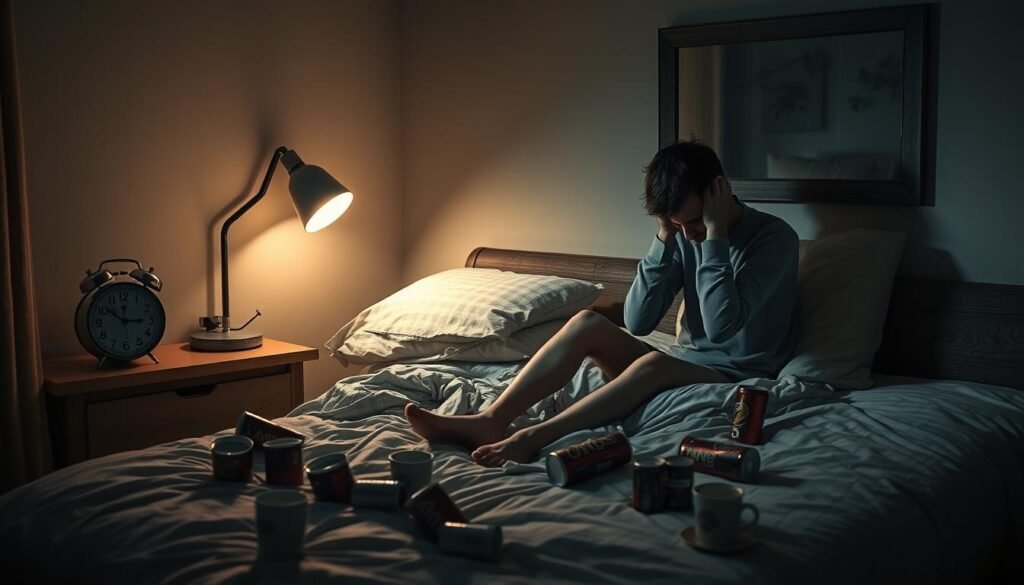About 35% of adults in the U.S. sometimes face insomnia, while 10% deal with it regularly. This sleep problem makes it hard to sleep or stay asleep. It also causes big problems during the day. Knowing the difference between primary and secondary insomnia is key to understanding how to manage it.
Primary insomnia doesn’t come from other health issues or using substances. It’s often due to stress, emotional problems, or how one lives. Meanwhile, secondary insomnia comes from other medical conditions or the use of medications. Knowing the difference helps us understand primary and secondary insomnia better. It also shows us the best ways to treat them.
Looking into insomnia’s effects, risks, and problems shows its big impact on well-being. Treating these sleep disorders is important. It improves how we live since chronic insomnia can lead to mental and emotional issues.
Key Takeaways
- Insomnia is common, especially in women and the elderly.
- Primary insomnia lasts over a month without a clear cause. Secondary insomnia has linked health causes.
- Its signs are not sleeping well, sleeping too little, and feeling tired after sleeping.
- Long-term insomnia can cause daytime sleepiness and more accidents.
- Handling it well may need changes in behavior, medicine, and daily habits to sleep better.
Overview of Insomnia
Insomnia affects many, with about 30% of adults in the U.S. facing it. It sometimes comes with other health issues. Stress, environment, lifestyle, and health problems can trigger it.
Those with insomnia may find it hard to fall asleep or stay asleep. They feel tired during the day, even with the chance to rest. Insomnia doesn’t just affect sleep; it impacts daily life and health, too.
Understanding insomnia well is key to managing it. There are many treatments, like therapy, changes in daily habits, or even medication. Things like keeping a regular sleep time and avoiding caffeine before bed can help. Check out this helpful resource for more information.
What is Primary Insomnia?
Primary insomnia is a sleep problem not caused by other health issues. It makes starting or keeping sleep difficult, leading to less sleep. People with this issue often feel tired after waking up. They also find it hard to focus during the day.
Studies show that people with primary insomnia get about six hours of sleep a night. This is less than the eight hours others get. Not sleeping enough harms both body and mind. It can lead to health problems like heart disease and obesity. It often runs in families, showing a possible genetic link.
- Primary insomnia tends to fluctuate in severity, improving or worsening over extended periods.
- Sleep state misperception or paradoxical insomnia affects a significant portion of the adult population.
- Diagnostic assessments may involve sleep studies and questionnaires to evaluate sleep quality and patterns.
- Lifestyle changes, including limiting caffeine and avoiding screens before bedtime, can help alleviate symptoms.
- Cognitive Behavioral Therapy for Insomnia (CBT-I) and other therapies frequently offer effective treatment options.
About 9% to 50% of adults suffer from primary insomnia. It poses a constant challenge. Affected individuals should try different methods. This will help improve their sleep and overall life quality.
| Symptoms | Impact |
|---|---|
| Trouble waking up | Increased fatigue |
| Difficulties concentrating | Poor work performance |
| Irregular sleep patterns | Emotional irritability |
| Heightened sensitivity to noise | Disturbed sleep environment |
| Lack of energy for daily activities | Decreased quality of life |
What is Secondary Insomnia?
Secondary insomnia happens when sleep issues arise from clear causes. These can be health concerns, emotional problems, or using certain substances. Unlike primary insomnia, which stands alone, secondary insomnia always has another cause behind it. It can start from things like anxiety, depression, and continuing pain.
Health issues like sleep apnea and hormonal shifts, especially during menopause, can disrupt sleep. Taking medicines for conditions like high blood pressure, allergies, and mental health can lead to secondary insomnia too. Knowing how these factors interconnect is vital for treating it and sleeping better.
About 10 to 30 percent of people deal with secondary insomnia. It’s growing due to stress and how we live our lives today. It’s important to understand how this type of sleep disorder can impact our daily living.
| Type of Insomnia | Duration | Common Causes | Typical Treatment |
|---|---|---|---|
| Acute Insomnia | 3 to 14 days | Short-term illnesses, travel, significant stress | Cognitive Behavioral Therapy, lifestyle changes |
| Chronic Insomnia | At least 3 months | Chronic stress, anxiety, depression | Behavioral therapy, pain management |
| Secondary Insomnia | Varies | Underlying medical conditions, substance use | Targeted treatment based on specific conditions |
Getting a deeper insight into secondary insomnia helps people get the right help. Knowing more about sleep disorders is crucial. It leads to better health and smarter choices in how we live.
Describe the Causes of Primary and Secondary Insomnia
It’s important to know what causes insomnia to treat it right. Insomnia’s causes are split into primary and secondary kinds. Primary insomnia happens on its own, without other health issues. Secondary insomnia is due to health problems or how we live.
Unpacking Primary Insomnia Causes
People with primary insomnia might face stress, big life changes, or things like noise. They might have trouble sleeping for a few weeks. Worrying about sleep can also lead to a cycle that’s hard to escape. The many causes of insomnia show how complex it is. Check more about this here.
Identifying Secondary Insomnia Causes
Secondary insomnia comes from health issues like depression or asthma, or habits like too much caffeine. These factors make insomnia worse. Mental health, like PTSD or anxiety, is also linked to it. Understanding these causes helps in finding the right way to deal with sleep problems.
| Type of Insomnia | Causes | Characteristics |
|---|---|---|
| Primary Insomnia | Environmental stressors, genetic factors | Independent of other medical issues |
| Secondary Insomnia | Depression, asthma, arthritis, lifestyle factors | Linked to other health problems |
Impact of Stress on Sleep Patterns
Stress really affects how well we sleep. Different kinds of stress have different impacts. Short-term stress comes from daily challenges, while long-term stress affects our health over time. Knowing how stress messes with sleep and learning to manage it can help us sleep better.
Life Events and Stress Management
Big life changes, like losing someone or a job, can disrupt sleep. This can lead to short-term insomnia, hurting both mind and body. It’s important to handle these stressors well.
Some useful ways to manage stress are:
- Mindfulness meditation
- Cognitive-behavioral therapy
- Regular physical exercise
Using these methods can help reduce stress’s effect on sleep, leading to a better rest. Research shows that 10% to 15% of adults have daytime problems because they don’t get enough sleep. This shows why it’s key to manage stress well.
The Role of Chronic Stress
Long-term stress is a bigger problem for sleep. It often ruins REM sleep and reduces deep sleep time. This can make health problems worse. When stressed for too long, our bodies make more cortisol and adrenaline. This changes our sleep patterns and overall health.
If you’re dealing with ongoing stress, it’s vital to get help. Keeping an eye on your stress and making lifestyle changes can avoid sleep issues. Noticing signs like constant muscle tightness and a fast heart rate is the first step. This lets you manage stress better and get back to sleeping well.
Lifestyle Factors Contributing to Insomnia
It’s crucial to know how lifestyle impacts sleep quality to improve health. Many habits and the environment affect our sleep at night.
Sleep Hygiene Best Practices
Good sleep hygiene greatly improves sleep quality. Here are some tips:
- Maintain a consistent sleep schedule by sleeping and waking at the same time each day.
- Create a calming bedtime routine to tell your body it’s time to relax.
- Avoid too much screen time before bed since blue light harms melatonin production.
- Keep your bedroom dark, cool, and quiet for better sleep.
- Limit naps in the day to not mess up night sleep.
Effects of Caffeine, Alcohol, and Nicotine
Some substances hurt your sleep. Knowing their effects helps make better choices:
| Substance | Effects on Sleep | Recommendations |
|---|---|---|
| Caffeine | Stimulates the central nervous system; can delay sleep onset | Avoid consumption in the afternoon and evening |
| Alcohol | Initially induces drowsiness but leads to fragmented sleep | Limit intake, especially close to bedtime |
| Nicotine | Acts as a stimulant, making it harder to fall and stay asleep | Seek cessation support if struggling with tobacco use |

To improve sleep quality, use good sleep habits and tackle bad lifestyle choices. These steps can change sleep patterns and better daily life.
Medical Conditions Associated with Insomnia
It’s vital to know how health problems and insomnia are linked. Many health issues can disrupt sleep, showing insomnia’s complexity. In the U.S., 10 to 15% of people suffer from insomnia. Finding the root causes is key to dealing with it.
Common Medical Conditions Affecting Sleep
Some health problems have a big effect on how well you sleep. People with chronic pain, like arthritis or fibromyalgia, often can’t sleep well. This is because they’re in too much pain. For those with stomach issues, like IBS or GERD, about 55% have insomnia. This is a lot more than the 20% of people without these problems.
Pregnancy causes big changes in sleep. Nearly 78% of pregnant women face sleep issues. Anxiety, feeling sick, and needing to go to the bathroom a lot affect their sleep.
Prescribed Medications and Their Side Effects
Some drugs for other health issues may cause trouble sleeping. For example, antidepressants, like SSRIs such as Prozac, can lead to insomnia. Medicines for high blood pressure, heart disease, ADHD, and Parkinson’s might also make it hard to sleep.
Doctors face challenges in dealing with insomnia. They need to know how medical conditions and drugs affect sleep. This helps them plan better treatments. These treatments aim at improving health and solving sleep problems. To learn more about how health issues affect insomnia, check out this article.
The Importance of Circadian Rhythms
Circadian rhythms help control our sleep cycles and health. These internal clocks manage our sleep-wake patterns. Shift work, time zone changes, or uneven sleep can upset these rhythms. This can cause insomnia, hurting our mental and physical health.
Sticking to a regular sleep schedule helps keep our circadian rhythms in check. Aligning sleep with natural rhythms can improve sleep quality and length. With more regular sleep, insomnia’s effects can lessen. This can boost energy and mood.
Light plays a big role in managing circadian rhythms. Daytime natural light keeps us alert and energized. At night, lower light signals it’s time to sleep. Melatonin, produced in the evening, helps switch from wakefulness to sleep, reacting to light exposure.
Handling sleep issues often means looking at the whole picture. This includes changing behaviors, tweaking our environment, and sometimes seeking medical help. For those struggling with sleep-related anxiety, finding good advice is key. Check out this helpful article for more information.

| Disorder | Characteristics | Demographics |
|---|---|---|
| Delayed Sleep-Wake Phase Disorder | Difficulty falling asleep and waking at socially acceptable times | Common in adolescents |
| Advanced Sleep-Wake Phase Disorder | Early sleep onset and morning awakening | More prevalent in older adults and males |
| Irregular Sleep-Wake Rhythm Disorder | Unpredictable sleep patterns often leading to insomnia | Common in patients with dementia and older individuals |
| Jet Lag Disorder | Sleep disruption from crossing time zones | Affects travelers |
Risk Groups and Demographics Affected by Insomnia
Insomnia affects many people, with some being more at risk. About one-third of adults will face light insomnia sometime in their lives. About 1 in 10 adults could deal with chronic insomnia. This shows that some groups are more likely to suffer from this issue.
When we look at gender, we see that women and men are affected differently. About 25% of women have insomnia, while the number drops to 20% for men. Hormonal changes are likely reasons behind this. Age is also key in determining who gets insomnia. A large 75% of people over 65 face sleep problems, showing the impact of growing older.
Kids also struggle with sleep, especially preteen girls. About 20% of children face insomnia. Looking at race, Black and Latinx people often have more sleep issues than White people. This reveals how widespread and varied insomnia is.
The table below gives a closer look at which groups suffer from insomnia the most.
| Demographic Group | Insomnia Symptoms Prevalence |
|---|---|
| Women | 25% |
| Men | 20% |
| Adults 65+ | 75% |
| Children (Age | 20% |
| Black & Latinx Individuals | Higher than White Individuals |
Understanding who is most at risk helps healthcare workers plan better treatments. Further research is key to tackling the broad impact of insomnia. For deeper insights, visit this link.
Consequences of Untreated Insomnia
About 70 million Americans are affected by insomnia. This leads to troubling consequences of untreated insomnia. Many people don’t see how big of an impact sleep disorders have on health.

Untreated insomnia can get worse over time. One in three adults in the U.S. get less sleep than the recommended seven hours. This not only makes you tired and cranky but also lowers your ability to think and do daily tasks.
Adults over 45 who sleep less than six hours are twice as likely to have strokes or heart attacks. That’s compared to those who get six to eight hours of sleep.
Teens are also at risk, gaining weight with every lost hour of sleep. Not sleeping enough leads to dangers in everyday life. For example, after being awake for 18 hours, driving becomes as bad as driving with a 0.05 blood alcohol level. Lack of sleep increases the chance of car and work accidents, showing the dangers of not sleeping enough.
Also, chronic insomnia can cause or worsen health problems like:
- Cardiovascular issues
- Thinking problems
- Mental health and mood issues
- Obesity-linked problems
- Constant tiredness
- Problems in school
- Drug use
- Issues in relationships
- Problems at work
Even though insomnia is common, not everyone with symptoms gets diagnosed. About two-thirds of people may show symptoms, but only 10% to 15% really have chronic insomnia. Those affected usually have trouble sleeping at least three nights a week for more than three months. This leads to big problems during the day.
The consequences of untreated insomnia go beyond health. It can hurt your overall life quality, making you more likely to face substance abuse, chronic pain, heart disease, and diabetes. Being female, older, having a lower income, or having health or mood issues also ups your risk for sleep disorders.
Conclusion
Grasping insomnia means knowing its main and secondary causes. This knowledge is key in finding the right treatment. Insomnia is common, affecting 5% to 15% of people. Surprisingly, up to 75% of sufferers deal with chronic symptoms. It’s crucial to look into genetics, lifestyle, and stress to sleep better.
If you’re dealing with insomnia, start with good sleep habits. This can make a big difference. Most people with insomnia have it for over a year. This shows the need for long-term solutions. Research is finding genetic links and new treatments. Being aware lets you manage your sleep better. This not only improves your life but also cuts healthcare costs. Insomnia costs over $100 billion each year.
In the end, understanding insomnia fully is essential for treating it well. Awareness and action are important. Good sleep habits are key. They boost your health and mental strength. This leads to better mental health.